

Our Courses

Introduction to R: Basic R syntax
This guided project is for beginners interested in taking their first steps with coding in the statistical language R. It assumes no previous knowledge of R, introduces the RStudio environment, and covers basic concepts, tools, and general syntax. By the end of the exercise, learners will build familiarity with RStudio and the fundamentals of the statistical coding language R.
-
Course by

-
 Self Paced
Self Paced
-
 4 hours
4 hours
-
 English
English

Application of Data Analysis in Business with R Programming
This Guided Project “Application of Data Analysis in Business with R Programming” is for the data science learners and enthusiasts of 2 hours long. The learners will learn to discover the underlying patterns and analyse the trends in data with Data Science functions.
-
Course by

-
 Self Paced
Self Paced
-
 3 hours
3 hours
-
 English
English

Tools for Data Science
In order to be successful in Data Science, you need to be skilled with using tools that Data Science professionals employ as part of their jobs. This course teaches you about the popular tools in Data Science and how to use them. You will become familiar with the Data Scientist’s tool kit which includes: Libraries & Packages, Data Sets, Machine Learning Models, Kernels, as well as the various Open source, commercial, Big Data and Cloud-based tools. Work with Jupyter Notebooks, JupyterLab, RStudio IDE, Git, GitHub, and Watson Studio.
-
Course by

-
 Self Paced
Self Paced
-
 18 hours
18 hours
-
 English
English
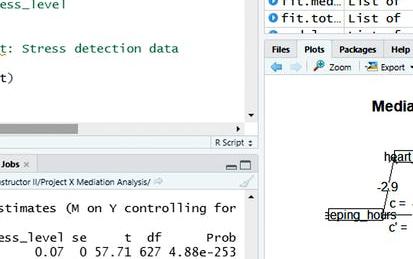
Mediation Analysis with R
In this project, you will learn to perform mediation analysis in RStudio.
-
Course by

-
 Self Paced
Self Paced
-
 2 hours
2 hours
-
 English
English

RStudio for Six Sigma - Basic Descriptive Statistics
Welcome to RStudio for Six Sigma - Basic Description Statistics. This is a project-based course which should take approximately 2 hours to finish. Before diving into the project, please take a look at the course objectives and structure. By the end of this project, you will learn to perform Basic Descriptive Analysis (Six Sigma) tasks hands-on using RStudio. Both R language and RStudio tools are Open Source and can be used for most Six Sigma analysis tasks without needing commercial software.
-
Course by

-
 Self Paced
Self Paced
-
 2 hours
2 hours
-
 English
English

Financial Risk Management with R
This course teaches you how to calculate the return of a portfolio of securities as well as quantify the market risk of that portfolio, an important skill for financial market analysts in banks, hedge funds, insurance companies, and other financial services and investment firms. Using the R programming language with Microsoft Open R and RStudio, you will use the two main tools for calculating the market risk of stock portfolios: Value-at-Risk (VaR) and Expected Shortfall (ES). You will need a beginner-level understanding of R programming to complete the assignments of this course.
-
Course by

-
 Self Paced
Self Paced
-
 15 hours
15 hours
-
 English
English
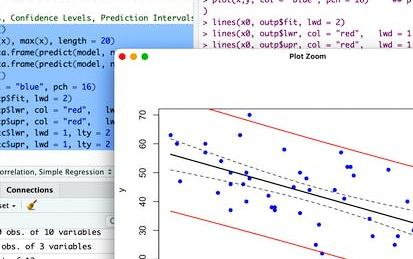
RStudio for Six Sigma - Hypothesis Testing
Welcome to RStudio for Six Sigma - Hypothesis Testing. This is a project-based course which should take approximately 2 hours to finish.
-
Course by

-
 Self Paced
Self Paced
-
 3 hours
3 hours
-
 English
English

Reproducible Templates for Analysis and Dissemination
This course will assist you with recreating work that a previous coworker completed, revisiting a project you abandoned some time ago, or simply reproducing a document with a consistent format and workflow. Incomplete information about how the work was done, where the files are, and which is the most recent version can give rise to many complications. This course focuses on the proper documentation creation process, allowing you and your colleagues to easily reproduce the components of your workflow.
-
Course by

-
 Self Paced
Self Paced
-
 20 hours
20 hours
-
 English
English

Fundamentals of Data Analytics in the Public Sector with R
Gain a foundational understanding of key terms and concepts in public administration and public policy while learning foundational programming techniques using the R programming language. You will learn how to execute functions to load, select, filter, mutate, and summarize data frames using the tidyverse libraries with an emphasis on the dplyr package.
-
Course by

-
 Self Paced
Self Paced
-
 15 hours
15 hours
-
 English
English
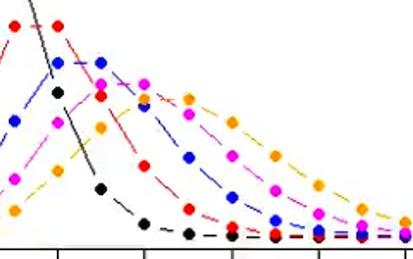
Introduction to Distributions in R
This project is aimed at beginners who have a basic familiarity with the statistical programming language R and the RStudio environment, or people with a small amount of experience who would like to review the fundamentals of generating random numerical data from distributions in R.
-
Course by

-
 Self Paced
Self Paced
-
 2 hours
2 hours
-
 English
English
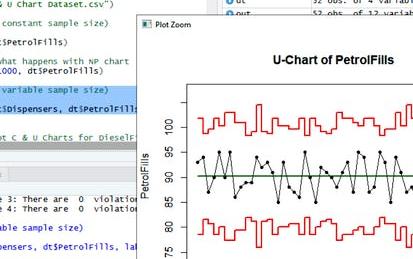
RStudio for Six Sigma - Control Charts
Welcome to RStudio for Six Sigma - Control Charts. This is a project-based course which should take under 2 hours to finish. Before diving into the project, please take a look at the course objectives and structure. By the end of this project, you will learn to identify data types (Variables, Attribute Type I & II), understand the overview of Statistical Process Control, pick the right Control Chart based on the data type and other criteria, plot and interpret control charts.
-
Course by

-
 Self Paced
Self Paced
-
 2 hours
2 hours
-
 English
English

Demand Planning in RStudio: Create Demand Forecast
This Guided Project Demand Planning in RStudio: Create Demand Forecast is for Supply Chain and/or Operations Analysts.
-
Course by

-
 Self Paced
Self Paced
-
 4 hours
4 hours
-
 English
English

Machine Learning Algorithms with R in Business Analytics
One of the most exciting aspects of business analytics is finding patterns in the data using machine learning algorithms. In this course you will gain a conceptual foundation for why machine learning algorithms are so important and how the resulting models from those algorithms are used to find actionable insight related to business problems. Some algorithms are used for predicting numeric outcomes, while others are used for predicting the classification of an outcome. Other algorithms are used for creating meaningful groups from a rich set of data.
-
Course by

-
 Self Paced
Self Paced
-
 14 hours
14 hours
-
 English
English

Data Analysis in R with RStudio & Tidyverse
Code and run your first R program in minutes without installing anything! This course is designed for learners with no prior coding experience, providing foundational knowledge of data analysis in R. The modules in this course cover descriptive statistics, importing and wrangling data, and using statistical tests to compare populations and describe relationships.
-
Course by

-
 Self Paced
Self Paced
-
 10 hours
10 hours
-
 English
English

Exploratory Data Analysis for the Public Sector with ggplot
Learn about the core pillars of the public sector and the core functions of public administration through statistical Exploratory Data Analysis (EDA). Learn analytical and technical skills using the R programming language to explore, visualize, and present data, with a focus on equity and the administrative functions of planning and reporting. Technical skills in this course will focus on the ggplot2 library of the tidyverse, and include developing bar, line, and scatter charts, generating trend lines, and understanding histograms, kernel density estimations, violin plots, and ridgeplots.
-
Course by

-
 Self Paced
Self Paced
-
 18 hours
18 hours
-
 English
English
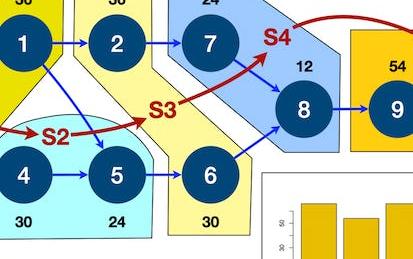
Line Balancing With MILP Optimization In RStudio
By the end of this project, you will learn to use R lpSolveAPI.
-
Course by

-
 Self Paced
Self Paced
-
 3 hours
3 hours
-
 English
English

Data Science Methods for Quality Improvement
Data analysis skills are widely sought by employers, both nationally and internationally. This specialization is ideal for anyone interested in data analysis for improving quality and processes in business and industry. The skills taught in this specialization have been used extensively to improve business performance, quality, and reliability. By completing this specialization, you will improve your ability to analyze data and interpret results as well as gain new skills, such as using RStudio and RMarkdown.
-
Course by

-
 Self Paced
Self Paced
-
 English
English

IBM Data Science
Prepare for a career in the high-growth field of data science. In this program, you’ll develop the skills, tools, and portfolio to have a competitive edge in the job market as an entry-level data scientist in as little as 4 months. No prior knowledge of computer science or programming languages is required. Data science involves gathering, cleaning, organizing, and analyzing data with the goal of extracting helpful insights and predicting expected outcomes.
-
Course by

-
 Self Paced
Self Paced
-
 English
English

Business Analytics
Our world has become increasingly digital, and business leaders need to make sense of the enormous amount of available data today. In order to make key strategic business decisions and leverage data as a competitive advantage, it is critical to understand how to draw key insights from this data.
-
Course by

-
 English
English

Data Analytics in the Public Sector with R
Every government entity collects and stores millions of data points to perform administrative and legislative duties, allocate resources, and make decisions. Professionals in the public sector need the necessary skills to accurately interpret and inform administrators and policymakers about the meaning behind these data. This Specialization will equip you with fundamental technical skills using the R programming language to gather, manipulate, analyze, visualize, and interpret data to inform public policy and public administrative functions.
-
Course by

-
 Self Paced
Self Paced
-
 English
English
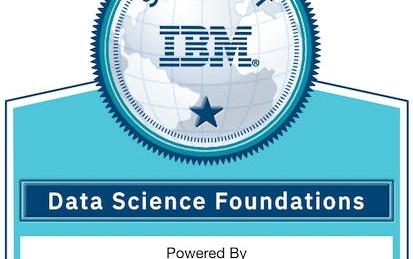
Introduction to Data Science
Interested in learning more about data science, but don’t know where to start? This 4-course Specialization from IBM will provide you with the key foundational skills any data scientist needs to prepare you for a career in data science or further advanced learning in the field. This Specialization will introduce you to what data science is and what data scientists do. You’ll discover the applicability of data science across fields, and learn how data analysis can help you make data driven decisions.
-
Course by

-
 English
English
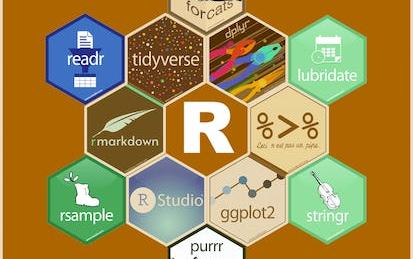
Expressway to Data Science: R Programming and Tidyverse
R is one of the most popular languages used in the data science community and essential for any aspiring data scientist. This specialization will teach you how to do data science in R whether you are a beginning or a seasoned programmer. You will begin this three-course specialization by reviewing the fundamentals of programming in R and the importance of creating reproducible research.
-
Course by

-
 Self Paced
Self Paced
-
 English
English

RStudio for Six Sigma - Process Capability
Welcome to RStudio for Six Sigma - Process Capability. This is a project-based course which should take under 2 hours to finish.
-
Course by

-
 Self Paced
Self Paced
-
 3 hours
3 hours
-
 English
English
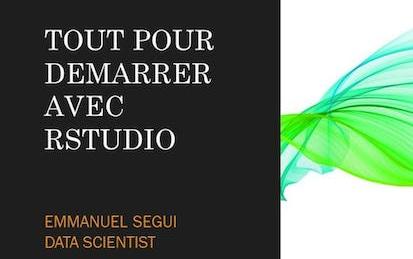
Tout Pour Démarrer avec RStudio
Dans ce cours d'une heure, basé sur un projet, vous apprendrez comment démarrer avec RStudio IDE, sur votre ordinateur ou sur la solution en ligne de RStudio, comment créer des projets, installer des librairies R, ainsi qu'apprendre comment afficher des cartes interactives, des graphiques et des tableaux avec 1 ligne de code.
-
Course by

-
 Self Paced
Self Paced
-
 3 hours
3 hours
-
 French
French

R Programming and Tidyverse Capstone Project
In this third and final course of the "Expressway to Data Science: R Programming and Tidyverse" specialization you will reinforce and display your R and tidyverse skills by completing an analysis of COVID-19 data! Here is a chance to apply your skills to a real-world dataset that has effected all of us. Throughout the capstone, you will import COVID-19 data; clean, tidy, and join datasets; and develop visualizations. You will also provide some analysis and interpretation to your results, preparing you for your journey into data science.
-
Course by

-
 Self Paced
Self Paced
-
 10 hours
10 hours
-
 English
English



